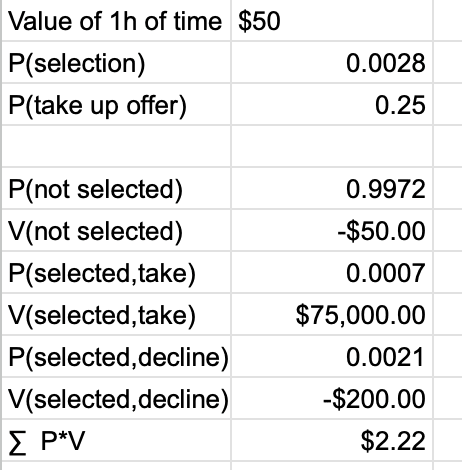Here's the link to apply: https://dvprogram.state.gov
Each year, the United States runs a lottery for Green Cards (permanent residence visas). If you think you'd have a higher impact working in the United States, consider applying by this year's deadline, 7 November 2023.
I wrote a long-form description of the process to apply last year, which provides a useful guide. That post was reviewed by a United States immigration lawyer and I don't think anything significant has changed, but make sure to read (or at least skim) the US State Dept DV-2025 Instructions in addition to my explainer.
In short:
- The US issues around 55,000 green cards each year via a lottery.
- Unless you were born in a country which already has really significant migration to the US (list below, but note that UK born people can apply this year), you can probably enter that lottery.
- Even if you were born in an ineligible country, you could be eligible if your parents or spouse were born in an eligible country.
- It does not cost you any money to enter, you don't need a passport to enter, you can do it online, and it probably won't take much of your time!
- Your chance of success in a given year as an individual ranges from around 0.28% (worst success rate for Asia region in 2007-2021 fiscal years) to around 10.03% (best success rate for Oceania region in 2007-2021 fiscal years).
- You can increase your probability of success by having a spouse (or partner who you would be willing to marry if selected) who also applies - only one of you needs to be selected for you both to move.
- This is a game you can play every year, increasing your chances a fair bit (see the table below).
- I don't know how many EAs applied last year after seeing my post, but I've been in contact with 14 people who entered the lottery and know of at least two people who were successful.
- Do consider whether you applying to the Diversity Lottery is, on expectation, good for the world. This is a zero-sum game, so your success comes at another applicant's expense - but if you expect to be more effective doing direct work or even expect to increase your earnings and, thus, your donations then I think it's a good idea to apply.
- There are some legal risks to consider, but I think these are mostly pretty theoretical. They are discussed in last year's long-form description of the process to apply.
- Finally, if you are going to apply, don't forget! The deadline is 7 November 2023 at 12.00pm ET, but anecdotally the submission system is usually pretty overloaded in the last week, so consider applying earlier if you can.
Even if you have a low chance of success, the E(V) is good:
For most folks looking at doing direct EA work, it probably doesn't even make sense to think through the probabilities - the E(V) is straightforwardly positive. But what about someone who is on the fence, and is perhaps focussed just on earning to give?
Even at a really pessimistic 0.28% chance (worst historical selection probability for folks in the 'Asia' geographic region) and a USD50 value on an hour of your time (assume 1h to apply, and 4h if selected to decide whether to continue) it all breaks even on expectation if you think you/the world gets USD 75000 of benefit (lifetime, not annual) from you moving to the USA. Even if you only spent 10 years in the US, you'd make that back if moving to the US increased your earnings by just USD 7500/y.

If your time is suuuuper scarce and you can't really see yourself having impact in the US, then don't apply. Otherwise I suggest you give it some thought!
Countries whose chargeable nationals can't apply this year
Note that this application round UK nationals once again qualify - this will likely be of interest to UK EAs who were unable to apply last year. The list is otherwise unchanged.
You are ineligible for the application round if you were born in one of the following countries:
Bangladesh, Brazil, Canada, The People’s Republic of China (including mainland and Hong Kong born), Colombia, Dominican Republic, El Salvador, Haiti, Honduras, India, Jamaica, Mexico, Nigeria, Pakistan, Philippines, Republic of Korea (South Korea), Venezuela, and Vietnam.
Natives of Macau SAR and Taiwan are eligible.
However, a person who is a native of one of the ineligible countries below may be able to qualify by 'charging' (don't ask me why they call it this!) to another country on the basis of their own spousal or parental circumstances. Basically, you might be able to claim your parent's or spouse's country of birth for the purpose of qualifying for the lottery
Disclaimer: I'm a lawyer, but not a United States lawyer. This isn't legal advice. If you think you need legal advice, speak to a United States immigration lawyer. If you need help finding a United States immigration lawyer, DM me and I can try to help.

I would've ignored this important opportunity if not for this post (because I was not aware that UK situation had changed this year). Thank you Tyrone!
Yasssssssss
Thanks for writing this PSA, this was interesting! Re: the list of eligible countries, if I'm understanding your long-form post correctly, where you live and what nationality you have don't matter for this process, which took me a while to understand.
So I'm wondering if this paragraph:
Would be clearer if rephrased as:
And same note for this paragraph:
To something like, "You are ineligible for the application round if you were born in one of the following countries", and swap out the word "nationals".
Thanks heaps Angelina - I agree. Thanks for pointing out the need for clarification.